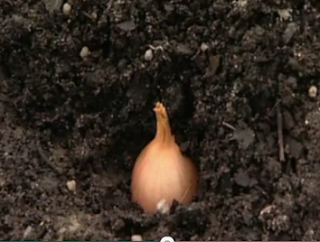And I should state for the record, that I’m going to try growing that perfect onion down in southwest Missouri where I'm sure it will be an interesting challenge!
Some years ago, I did a YouTube video titled ‘Onions are Easy to Grow’ in which I chronicled an attempt to grow a crop of onions from some locally purchased onion sets. In the video you can tell that many of these often-grown vegetables of the genus Allium were not very big even at maturity. And, while I didn’t complain, I wondered if perhaps I could do better a few years later in 2013!
To that end, I
researched the growing of onions and quickly learned that although I could grow
them from seed, the long growing time (4 months or more) made raising them in a
Zone 6 garden somewhat problematic. I’d have to start them indoors early on and
that seems to be a lot of bother. Instead, I opted to go with a batch of
partially grown yellow onion sets that would require much less time in the
garden before maturing. One cravat that I came across was the admonition to
select sets that were at least ½ inch across as these would be ‘less likely to
bolt’! I also read that I need to select ‘short day’ onions for my location here
in southwest Missouri.
Apparently, onions are sensitive to the length of the day to tell them when to
bulb up. Interesting, I thought.
After I settled on
using locally purchased onion sets, I next wanted to pay some attention to the
soil I was to grow them in. I read that a ‘loose fertile and sandy loam’ type
of soil was best and that I would need to keep the area weed free for best
results. I also would need to make sure that the soil around the young plants
was covered with mulch to help preserve moisture. Apparently, onions also need
about an inch of water per week to keep them from ‘splitting’. Another tip
concerned the application of fertilizers and or nitrogen. Apparently I would
want to skip these as the added nitrogen would tend to promote lush top
growth at the expense of the bulbs. That’s definitely not what I wanted to do!
Finally, I was advised that once the tops begin to turn yellow, that I needed
to take a rake and to bend them over – this action prevents the sap from
flowing to the leaves and hastens the bulbing process.
OK! With this
advice in hand and a bagful of onion sets, I was ready to get out and prep an
area of one raised bed that I had set aside just for this effort. It was early
March and I was ready to get out there and do my thing…
Next installment – Mid March 2013



